All types of physical activity share one common trait — hard workouts require equally vigorous periods of recovery. How you spend the hours between your training sessions plays a tremendous role in not just your long-term progress in the gym, but how you’ll physically feel along the way.
Cold plunging, a modality centered around deliberate immersion in near-icy waters, is all the rage as an active recovery modality as of late. And whether you’re a die-hard strength athlete pursuing your next one-rep max or you exercise just to stay healthy and happy, you might be wondering if a cold plunge can benefit you.
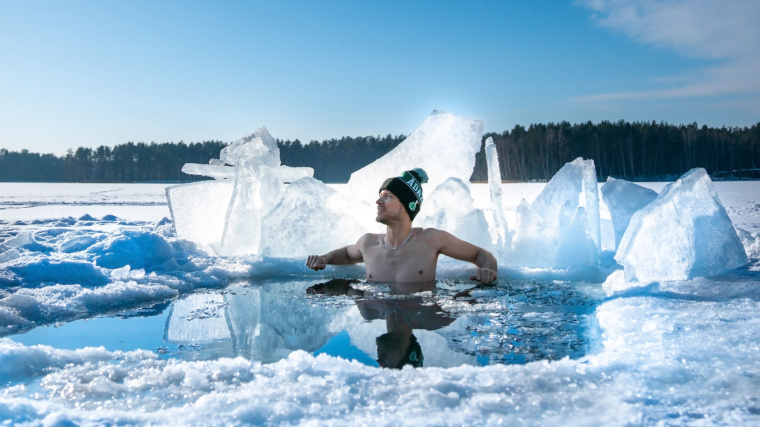
Luckily, when it comes to cold plunging, the science is crystal clear: Tactical cold water immersion comes with a host of recovery and performance-based benefits. But as with any health practice, it’s all about dosage. When you choose to go neck-deep in frigid waters is just as important as how frequently you plunge or how long you can hold out once you submerge.
What Is Cold Plunging?
The practice of cold plunging is a form of cold water immersion, a health technique with origins that stretch back far longer than you’d probably think. Culturally, cold water immersion has historically been practiced as winter swimming in certain climates, or paired with sauna as what’s called contrast therapy. (1)
Modern-day cold plunging as a recovery modality entails immersing oneself into near-frigid waters for a brief period. Scientific data analyzing the potential health benefits of cold plunges generally asserts that anywhere from five to 15 minutes in waters of 10 to 15 degrees Celsius is the ballpark you should aim for. (2)
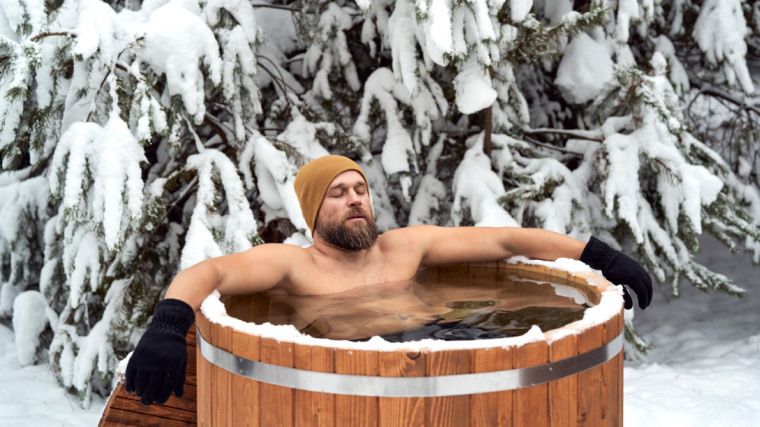
[Read More: Best Home Gym Machines]
Practitioners of the cold plunge partake in it in a variety of ways. Some go for the tried-and-true technique of filling a bathtub with water and bagged ice, while others build a DIY cold plunge at home to avoid springing for a pricy specialized tank. If you want to do things the old-fashioned way and you live somewhere that supports it, diving into an iced-over pond or lake will also do the trick.
Benefits of Cold Plunging Before a Workout
Since most people utilize cold plunges for their physiological effects, you generally won’t see too many potent bodily changes by taking a dip prior to your workout. However, that doesn’t mean that a pre-workout plunge is altogether useless.
- Ten minutes in near-icy waters is a good way to wake yourself up if you’re feeling sluggish or groggy prior to your workout.
- Plunging prior to a bodybuilding workout will temporarily reduce blood circulation, but can still afford you the benefits of increased mental clarity and stress reduction if that’s what you’re after.
Drawbacks
Hitting the bath before a session, though, comes with its own drawbacks. Most of the internal changes associated with cold water immersion are of relevance after you’ve taxed your body with strength training, high-intensity cardio, or any other form of vigorous exercise.
[Read More: The 16 Best Pre-Workout Supplements]
An ice bath will also temporarily reduce blood circulation and “stiffen” your joints, which may affect your ability to get a good mind-muscle connection going during your workout.
Benefits of Cold Plunging After a Workout
Most of the scientific studies on cold water immersion involve subjects taking dips after their training session. As such, the findings generally support cold plunging as a viable means of enhancing muscular recovery.
- Some researchers have found that, for mixed martial arts athletes who also perform sprints and interval training, cold plunging both improved recovery time and enhanced feelings of general wellness. (3)(4)
- There are also data supporting cold plunges as a way of reducing post-workout delayed-onset muscle soreness, especially if participants actively believe in the merit of the modality. (5)
- A study on “winter swimmers” marked a period of elevated thermogenesis (fat burning) after bouts of swimming in near-frigid temperatures. (6)
Drawbacks
Make no mistake, a cold plunge is no cure-all, and its applicability is strongly tied to what type of exercise you engage with. For the iron-minded strength athlete, taking a chilled dip might actually do more harm than good.
Certain studies have argued that, while cold exposure may acutely increase fat burning, that change is also blunted by a compensatory uptick in appetite. (7) In essence, taking an ice bath after your workout may cause you to overshoot your caloric intake by ramping up your hunger.
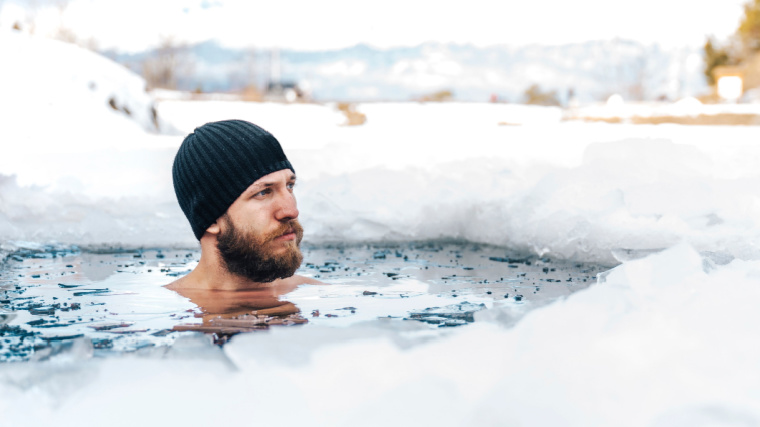
[Read More: Best Post-Workout Supplements]
Further, cold water immersion might actually dampen some of the most important benefits of lifting weights. Specifically, decreasing your muscular strength and endurance capacities. (8)
More concrete data have fairly strongly confirmed that a cold bath can blunt your muscular hypertrophy potential. (9) If you perform mainly bodybuilding workouts for aesthetics, you might want to steer clear of cold water immersion. Some researchers have gone so far as to consider post-exercise cold water therapy no more effective than a placebo. (10)
How To Cold Plunge
Before you can reap the benefits of a pre or post-workout dip into some icy waters, you need to know how to set up your own cold plunge.
Step 1 — Get Set Up
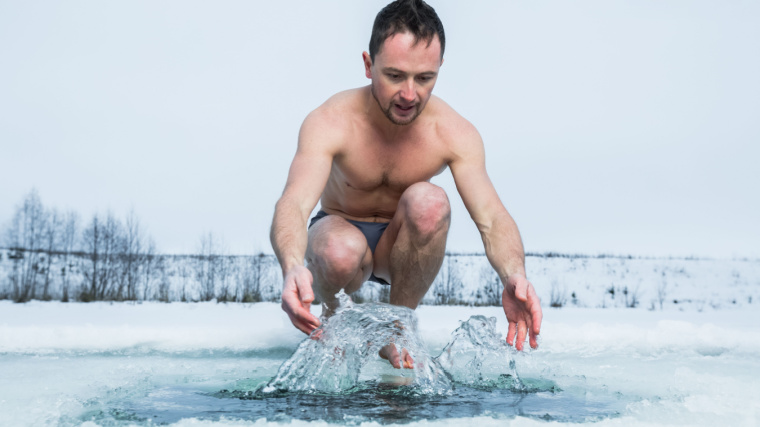
First, decide how you’re going to set up your plunge. If you don’t have a tub specifically designed for cold plunges, you can draw a bath with cold water or even fill an empty drum. Then, dump several bags of ice into the water to chill it.
Step 2 — Slip In
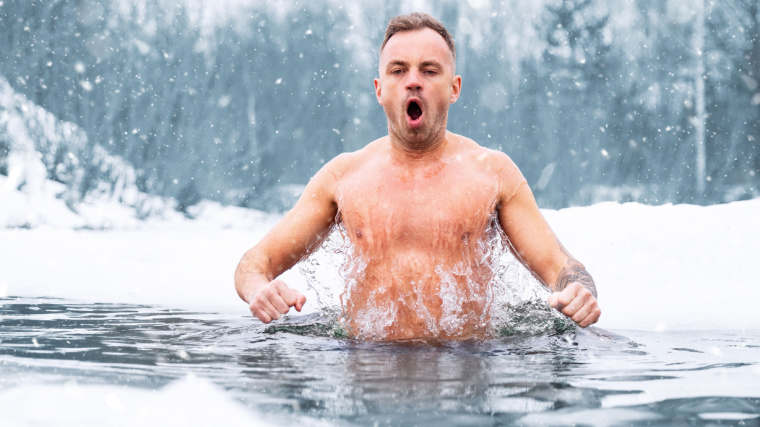
Immerse yourself in the water slowly, but confidently. Take care to monitor and regulate your breathing as you sink into the plunge. Take long, deliberate belly breaths and focus on remaining calm.
Step 3 — Meditate
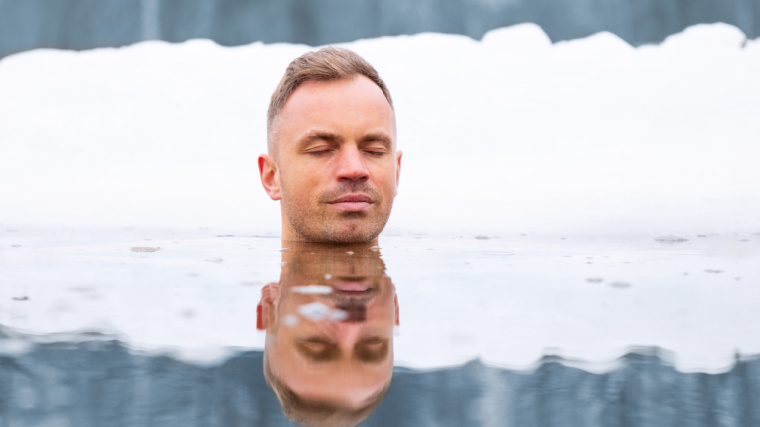
Once you’ve immersed yourself up to your shoulders, sit calmly, meditate, and regulate your breathing. Most data on cold plunging involves subjects submerging themselves fully; that is, dipping your head under as well, but it isn’t strictly necessary. Once you’ve plunged for anywhere from five to 15 minutes, hop out and dry yourself off as fast as possible.
[Read More: The 5 Best Fitness Trackers]
If you’re using a cold plunge as part of contrast therapy, take a minute before you head into the sauna to let your heart rate return to baseline.
FAQs
Still wondering if the cold plunge is right for you? Here are a couple of common questions, answered and unpacked.
Unfortunately, it depends. Taking a cold plunge prior to a workout can help you feel alert and awake, but also reduces blood flow and stiffens your joints. Most scientific studies indicate that cold plunging is better left for after your exercise session.
In most cases, yes, cold plunging after a workout is better than doing so before. The exception here is if you train predominantly for muscular hypertrophy; some data show that cold exposure can dampen muscle protein synthesis and thus, potentially, hinder your gains.
Cold plunging, ice baths, or winter swimming have all been popular recovery methods or health practices for many years. Research shows that cold plunging can improve certain health markers, regulate your mood, manage stress, and help you bounce back from hard physical exercise.
If you’re plunging for general health benefits, it doesn’t really matter when you take a dip. To maximize your return on investment regarding your workouts, you might want to plunge within a few hours after your training session. Data on the time-based effects of cold plunges aren’t super conclusive, though, so go for whatever feels sustainable for you.
References
- Esperland D, de Weerd L, Mercer JB. Health effects of voluntary exposure to cold water – a continuing subject of debate. Int J Circumpolar Health. 2022 Dec;81(1):2111789. doi: 10.1080/22423982.2022.2111789. PMID: 36137565; PMCID: PMC9518606.
- Versey, N. G., Halson, S. L., & Dawson, B. T. (2013). Water immersion recovery for athletes: effect on exercise performance and practical recommendations. Sports medicine (Auckland, N.Z.), 43(11), 1101–1130.
- Tabben, M., Ihsan, M., Ghoul, N., Coquart, J., Chaouachi, A., Chaabene, H., Tourny, C., & Chamari, K. (2018). Cold Water Immersion Enhanced Athletes’ Wellness and 10-m Short Sprint Performance 24-h After a Simulated Mixed Martial Arts Combat. Frontiers in physiology, 9, 1542.
- Lindsay, A., Carr, S., Cross, S., Petersen, C., Lewis, J. G., & Gieseg, S. P. (2017). The physiological response to cold-water immersion following a mixed martial arts training session. Applied physiology, nutrition, and metabolism = Physiologie appliquee, nutrition et metabolisme, 42(5), 529–536.
- Horgan, B. G., West, N. P., Tee, N., Drinkwater, E. J., Halson, S. L., Vider, J., Fonda, C. J., Haff, G. G., & Chapman, D. W. (2022). Acute Inflammatory, Anthropometric, and Perceptual (Muscle Soreness) Effects of Postresistance Exercise Water Immersion in Junior International and Subelite Male Volleyball Athletes. Journal of strength and conditioning research, 36(12), 3473–3484.
- Søberg S, Löfgren J, Philipsen FE, Jensen M, Hansen AE, Ahrens E, Nystrup KB, Nielsen RD, Sølling C, Wedell-Neergaard AS, Berntsen M, Loft A, Kjær A, Gerhart-Hines Z, Johannesen HH, Pedersen BK, Karstoft K, Scheele C. Altered brown fat thermoregulation and enhanced cold-induced thermogenesis in young, healthy, winter-swimming men. Cell Rep Med. 2021 Oct 11;2(10):100408. doi: 10.1016/j.xcrm.2021.100408. PMID: 34755128; PMCID: PMC8561167.
- Marlatt, K. L., Chen, K. Y., & Ravussin, E. (2018). Is activation of human brown adipose tissue a viable target for weight management?. American journal of physiology. Regulatory, integrative and comparative physiology, 315(3), R479–R483.
- Yamane, M., Ohnishi, N., & Matsumoto, T. (2015). Does Regular Post-exercise Cold Application Attenuate Trained Muscle Adaptation?. International journal of sports medicine, 36(8), 647–653.
- Roberts LA, Raastad T, Markworth JF, Figueiredo VC, Egner IM, Shield A, Cameron-Smith D, Coombes JS, Peake JM. Post-exercise cold water immersion attenuates acute anabolic signalling and long-term adaptations in muscle to strength training. J Physiol. 2015 Sep 15;593(18):4285-301. doi: 10.1113/JP270570. Epub 2015 Aug 13. PMID: 26174323; PMCID: PMC4594298.
- Broatch, J. R., Petersen, A., & Bishop, D. J. (2014). Postexercise cold water immersion benefits are not greater than the placebo effect. Medicine and science in sports and exercise, 46(11), 2139–2147.
Featured Image: Pandora Pictures / Shutterstock